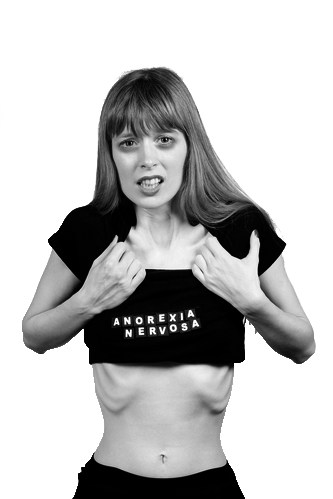Eating disorders, such as anorexia, bulimia, and binge eating disorder include extreme emotions, attitudes, and behaviors surrounding weight and food issues. Eating disorders are serious emotional and physical problems that can have life-threatening consequences for females and males.
The following information is a brief summary of the Feeding and Eating Disorders described in the American Psychiatric Association’s Fifth Edition of the Diagnostic and Statistical Manual of Mental Disorders (DSM-5), published in 2013. Click on the links below to learn more about the different types of eating disorders and their symptoms.
Anorexia Nervosa
Inadequate food intake leading to a weight that is clearly too low.
Intense fear of weight gain, obsession with weight and persistent behavior to prevent weight gain.
Self-esteem overly related to body image.
Inability to appreciate the severity of the situation.
Binge-Eating/Purging Type involves binge eating and/or purging behaviors during the last three months.
Binge Eating Disorder
Frequent episodes of consuming very large amounts of food but without behaviors to prevent weight gain, such as self-induced vomiting.
A feeling of being out of control during the binge eating episodes.
Feelings of strong shame or guilt regarding the binge eating.
Indications that the binge eating is out of control, such as eating when not hungry, eating to the point of discomfort, or eating alone because of shame about the behavior.
Bulimia Nervosa
Frequent episodes of consuming very large amount of food followed by behaviors to prevent weight gain, such as self-induced vomiting.
A feeling of being out of control during the binge-eating episodes.
Self-esteem overly related to body image.
The National Eating Disorders Association (NEDA) is the leading 501 (c)(3) non-profit organization in the United States advocating on behalf of and supporting individuals and families affected by eating disorders. Reaching millions every year, we campaign for prevention, improved access to quality treatment, and increased research funding to better understand and treat eating disorders. We work with partners and volunteers to develop programs and tools to help everyone who seeks assistance.
You are not alone. Help is just a call away!
If you or someone you know is struggling with an eating disorder, we are here to help.
Call NEDA’s toll free, confidential Helpline at
1-800-931-2237















More Stories
PIMA COUNTY HOSTS FEMA HIGH-CAPACITY COVID TESTING CENTER AT PCC WEST CAMPUS
Editor letter
This past month of April, The U.S. Census Bureau released congressional apportionment and population counts for every state.
Tucson City court closed this Friday and, on the holidays
Pima County opens another round of PPE Business Assistance
Sunnyside Foundation provides resources to enhance and accelerate the educational